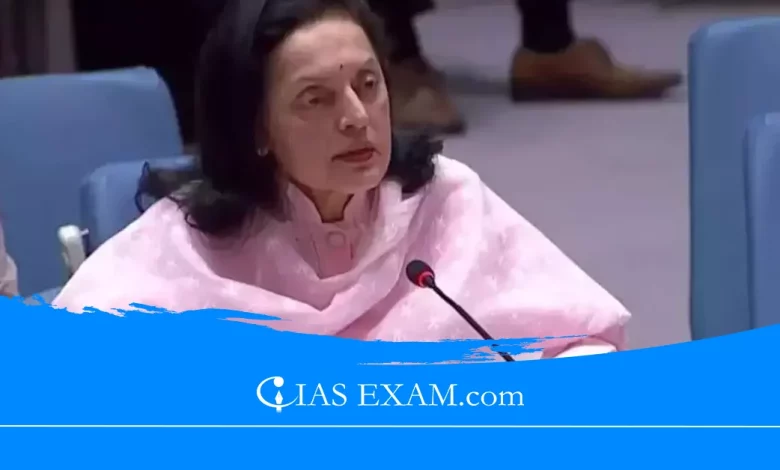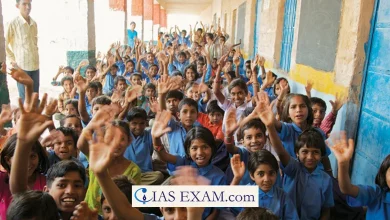UNGA Vote: India Abstains from Pakistan’s Islamophobia Resolution
Syllabus: International Relations[GS Paper-2]

Context
India chose to abstain during a United Nations General Assembly(UNGA) vote on a resolution concerning Islamophobia, proposed by Pakistan and supported by China. India emphasised the need for recognizing “religiophobia” against not just one, but multiple faiths including Hinduism, Buddhism, Sikhism, among others, which are also subjected to violence and discrimination.
UN passed a resolution outlining actions to address Islamophobia
- The United Nations General Assembly has adopted a resolution called “Measures to combat Islamophobia” introduced by Pakistan.
- The resolution condemns the mistreatment and violence towards Muslims, including disrespecting their holy book, attacking mosques, and acts of religious intolerance.
- 115 nations voted in favour of the resolution, with no votes against and 44 abstentions.
- The resolution calls for concerted action to fight violence against Muslims and requests the appointment of a special envoy by the UN Secretary-General to combat Islamophobia.
India’s position on the resolution
- India has provided several examples for the significance of including in the problem of religiophobia any manifestation of it not only against a certain religion.
- Moreover they argued it must be understood that these fears exhibit similarly with Abrahamic religions.
- The country has brought the world’s trend of some religions’ discriminatory attitude toward hinduism, buddhism, sikhism, and other faiths to light. Given that there are about 1.2 billion followers of Hinduism, over 535 million followers of Buddhism and more than 30 million followers of Sikhism, these religions get affected from the phobia of peoples towards religion too.
- The UN Interlocutor from India has observed that these attacks against places of worship were getting more and more frequent to such an extent that it became quite dangerous for many people to just go visit their local church, temple or mosque without fearing of being a victim of an unjust attack.
- They have shown the sample of religiophobia, like the destruction of Bamiyan Buddhas, law-breaking against sikh gurdwara, mass murders of Sikh pilgrims, temple attacks and the week is celebration for breaking idols in temples.
- India has raised protests against the UN resolution being established as standards on which countries may concentrate out of anxieties with religious or supreme factors that eventually poses a hindrance to peaceful co-existence and unity among states.
- They have already predestined everybody to get rid of the web of religious discrimination that is out there.
- India thinks that money sent only to oppose Islamophobia will create an unconsciousness which will promote the notions of fewer privileges and discrimination and will overlook the same challenges people of other faiths face.
About UNGA
- Purpose and Role: The UNGA plays the role of a platform where member countries are able to comment, and arrive at joint solutions on the issues under the UN Charter such as the development, security, and international law and human rights. Inside international and institutional entities’ systems, it plays a certain role, which is related to the regulation of the norm-setting process as well as the law codification.
- Membership: According unity with other 193 members, assembly of general UN, a member state has one vote to refer the matter to the General Assembly. Issues of great weight, including those relating to peace and security, enlargement membership, and the financial aspect, need two-thirds of Members to agree. The rest of the decisions are adopted by an automatic majority.
- Sessions: Once a year in September, the General Assembly holds its major session which might last for several months till its end. It may likewise convene its serendipitous or special sessions aimed at discussing the overriding issues.
- Main Committees: The UNGA is structured into several Main Committees, each handling a category of international affairs:
- Disarmament and International Security (First Committee)
- Economic and Financial Matters (Second Committee)
- Social, Humanitarian, and Cultural Issues (Third Committee)
- Special Political and Decolonization (Fourth Committee)
- Administrative and Budgetary Issues (Fifth Committee)
- Legal Matters (Sixth Committee)
Source: The Hindu
UPSC Mains Practice Questions
Q.Examine the implications of India’s decision to abstain from the UNGA vote on Pakistan’s resolution about Islamophobia. Discuss how this decision might affect India’s foreign relations, particularly with neighbouring countries and its stance on religious intolerance globally.





.png)



